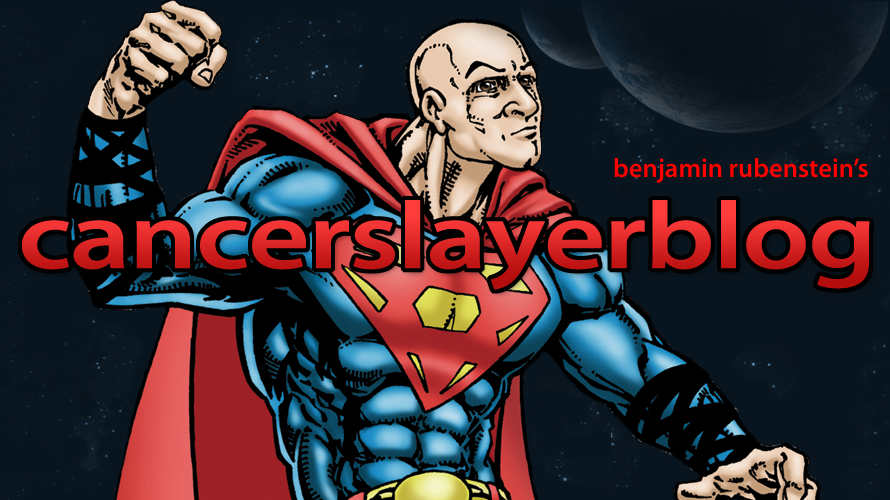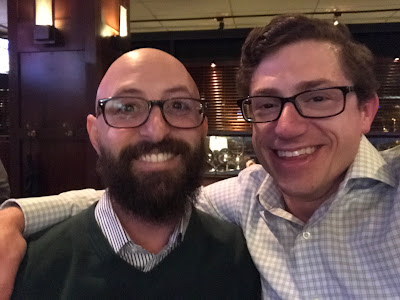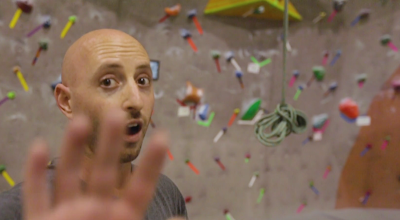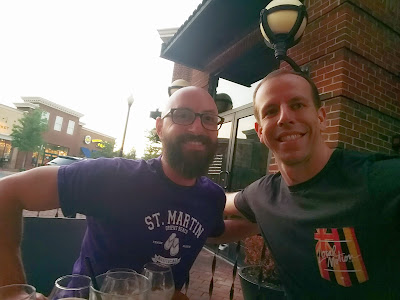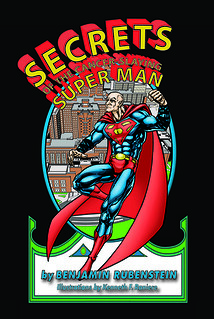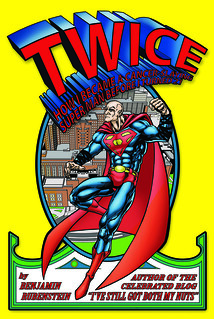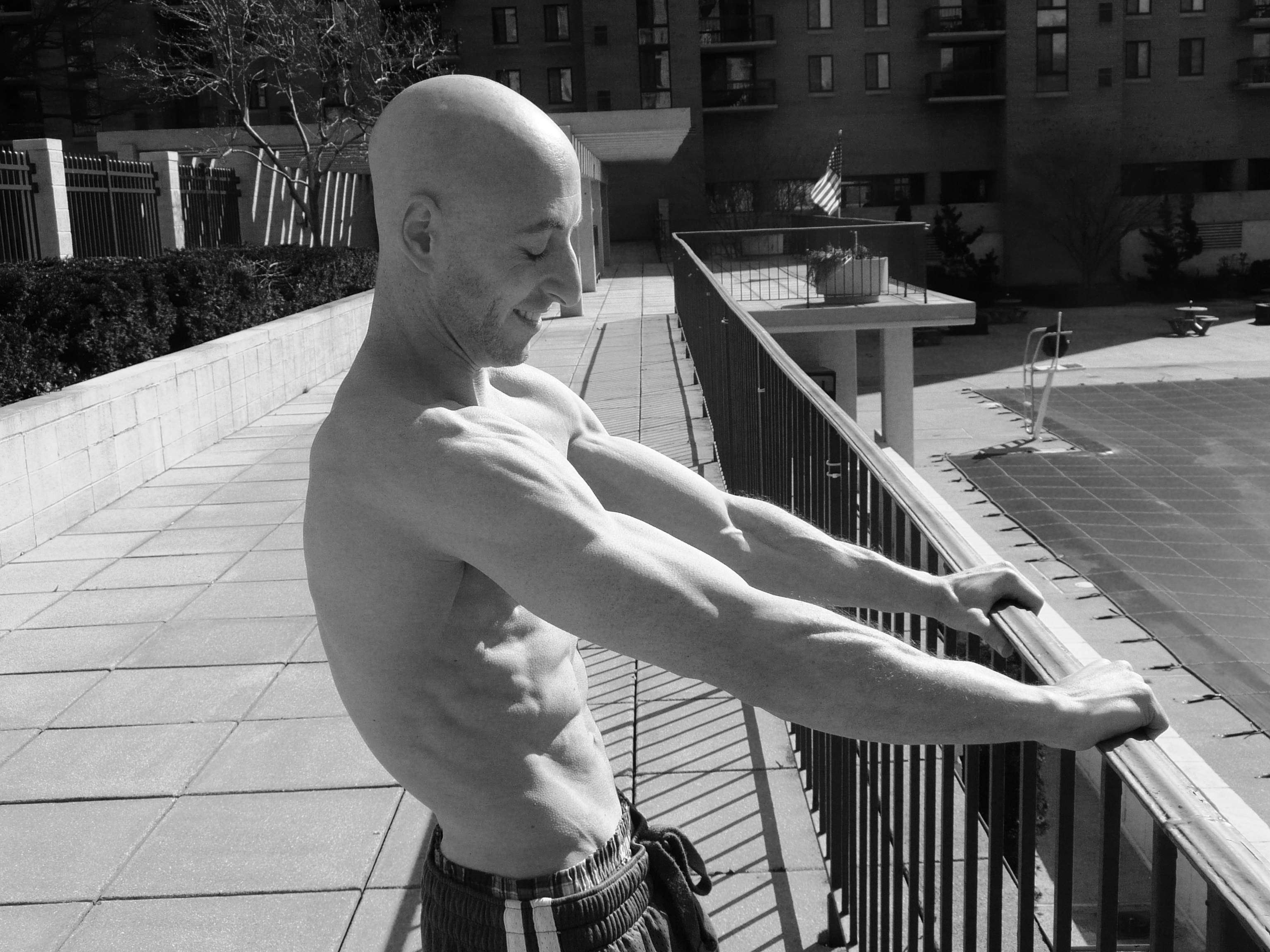Tomorrow, I’ll mail to the University of Southern Maine my thesis for my Master of Fine Arts in creative writing degree. Seeing it packaged and ready to go got me thinking about a gift from my first-semester advisor, Suzanne Strempek Shea. She gave me this little notebook to keep with me so my ability to write something is never far from my impulse to.

I labeled my pocket-sized notebook Ben Rubenstein’s Sucky Words to remind me that I have the freedom to write without judgement or consequence. In fact, I must always accept that any of my written work up until its final form sucks. Without that acceptance, I’d freeze, second-guess every word, and end up writing nothing. To be a writer is to be the opposite of a competitor. Whereas I imagine Tom Brady at night just grinding his teeth in fury as he stares at the ceiling above him and his wife Gisele at a poster of the 198 other players drafted before him, I give no fucks about how my writing compares to anyone else’s. In fact, rather than try to “beat” other writers, I’ll learn from them.
No, this past semester I was up at night staring at my ceiling thinking of which sucky words I’d add to my thesis. This project, which is the basis for my first novel,
consumed me. It felt important, even if it mattered to nobody but me and even if almost every word sucked. I think it felt important to me because, underneath the fictional short stories that composed the thesis, there was a little bit of my truth.
Below is a section of the preface to my thesis you can read or skim if you’d like. At five-thousand words, it is long (It’ll take an average reader 25 minutes to finish). And since it is mostly composed of snippets from my blog over the last 10.5 years, the words might suck. That’s fine. I accept that some words do suck. I also accept that my thesis sucks all the way up until it publishes in novel form some years from now and you get an opportunity to read it. And, I know I'd never tell Tom Brady he sucks or else he’d add me to his bedtime poster.
Partial Preface to My Final Thesis in Fiction
Sometimes, I wonder if I took an uncommon path to becoming a writer. Other times, I think the collection of uncommon paths some of us take in life for any endeavor outnumber the most common paths, which makes any one path, including my own, feel not so far-fetched. Either way, becoming a writer has been a fun, wrenching, exhilarating, crushing—ok, you get the idea—ride.
To demonstrate my path to becoming a writer, which now constitutes almost forty percent of my life, I wanted to piece together snippets from the stories I’ve posted over the last 10.5 years on what is now titled cancerslayerblog. With 451 posts, I knew I could succeed in doing this through the only path I can imagine: scouring only the 26,000 words from the posts under the
“writing/speaking” label and disregarding the remaining hundreds of thousands of words.
I am laughing now after having typed that paragraph. I am laughing because that is a perfect demonstration of the person I am: organized, efficient, determined, and ridiculous. Overcoming my challenges as a writer, now I realize, mirrors how
my brain has overcome its challenges caused by trauma.
Before I begin, I must set rules for myself. I will maintain the fake names I used in place of my actual friends’ names because, well, they’re fun. I will maintain my voice and tone from the original stories, though I do feel compelled to correct the grammar and syntax. Lastly, I will move the snippets around as best I can so that the story flows in chronological order, which may or may not be in chronological order of when they posted on my blog.
So, let’s see where this ride into my past takes us. Here is me, the writer, as described by me, the wannabe writer of the last 10.5 years.
* * *
Posted on cancerslayerblog Feb. 22, 2007
When I got cancer the second time, my mom’s friend gave me a diary. “You could write in it and then make it into a book someday.” I threw the diary in the trash. Strangely, over a year later I had an epiphany: I
should write a book.
Posted on cancerslayerblog and my employer’s intranet Sept. 6, 2017
This is my craft, which I chose without realizing it. That unconscious decision took place one Saturday night in July 2004 when I was 20. I was working at a Hollywood Video in my hometown Manassas, Virginia, during summer break. My job title was “guest services representative,” which was a fancy phrase for “DVD unlocker.” I wasn’t a stellar movie rental store employee. I was slower than my coworkers at checking out customers. Three times I forgot to give back a customer’s photo ID only to see her return for it about an hour later rather irritated. And, the store manager once chided me for showing
Top Gun instead of
Space Jam on the store’s TVs, which lined the top of the purple walls.
From
Top Gun: "Maverick, it's not your flying, it's your attitude. The enemy's dangerous, but right now you're worse.”
I guess I wanted to be the maverick of movie rental stores.
That night around 10 p.m., still with two hours left to unlock DVDs, I had an epiphany. I had to share this in person with one of my closest friends, so I texted Hamburgers to see if he would still be up at 1 a.m. He texted back that he would. Of course he’d be awake; Hamburgers usually went to bed around 6 a.m. unless his Xbox overheated first.
When we closed the store soon after midnight, I drove to Hamburgers’ parents’ house, and he met me outside in the cul-de-sac. I got out of the car and went to stand by the hood, because this felt too important to state while being seated. In the darkness, it was hard to see Hamburgers’ eyes so I focused mine just below his curly red hair. Then, I came out with it. “You and I should co-write a memoir.”
The idea had nothing to do with unlocking DVDs, and I’ll never know how or why it entered my consciousness hours before at Hollywood Video. In fact, it had been 11 years since I last wrote a story. That was about the Chicago Bulls star Scottie Pippen playing basketball one-on-one against an extraterrestrial. I even illustrated it. But under the bright lamps of a Hollywood Video store and few stars that were visible through Northern Virginia’s light pollution, I felt compelled to write again, and I knew Hamburgers and I had a story to tell.
Though we’d known each other since the fifth grade, we became close when we were 17 due to our shared understanding of illness. While I was getting treatment for my first major illness, a bone cancer called Ewing’s sarcoma, Hamburgers revealed to me in secret that he had acquired HIV from a contaminated blood product to treat his hemophilia when he was 3. Later, while at the University of Virginia together and after I had recovered from my second illness, a cancer of the bone marrow called myelodysplastic syndrome, we would stay up all night talking. We discussed whether to hide our diseases from new friends and romantic interests, how our diseases gave us perspective, and how they made Jujyfruits more rewarding. Man, we loved candy.
Hamburgers looked at me for some time before responding to my epiphany. Finally, he said that yes he would write this book with me and to get started; he’d catch up. Ecstatic, I drove home where I handwrote 500 words before falling asleep at 2:30 a.m.
The next morning I looked at my work. It was atrocious, and I don’t just mean my nearly indecipherable scribbles. It may have been the drabbest 500 words ever written. But, I kept writing—I had already started, so why not finish? Had I known a published memoir was typically around 85 thousand words or that Hamburgers didn’t even plan on writing the book with me and only agreed as a way to encourage me, maybe I wouldn’t have continued. But I did, and I never stopped.
Posted on cancerslayerblog March 21, 2009
October 2004: I am 8,000 words into my book and expect to complete it within a few months. I envision fame, fortune and girls. Lots and lots of girls.
December 2004: PingPongGirl agrees to help me with my book. She is ecstatic and honored that I asked for her assistance. PingPongGirl got a score of 1,380 on her first try on the SAT and reads above a third-grade level, though that was not a requirement for reading my rough draft, which belonged in a kindergartener’s marble composition book.
Later December 2004: PingPongGirl regrets getting involved after reading my first section. “Crap, crap, crap…um, okay…let’s start with this,” is her initial reaction, probably referring to the first sentence.
Summer 2005: I forgo a summer job to work on my book. I make huge gains with PingPongGirl helping along the way.
Fall semester 2005: I skip classes, friendly get-togethers and even sports to write (I chose
work over
sports!). I get my lowest semester-GPA of my college career: 1.97. I am proud of this because it is about as close as one can get to academic probation without actually getting on probation.
December 2005: PingPongGirl and I meet at one of UVA’s many libraries to discuss the title, all having something to do with my testicles. Other students must think we are in erotic film production. We decided on “I’ve Still Got Both My Nuts.” PingPongGirl tells me she loves the ending. If the bulk of my book is un-extraordinary, I am hopeful most readers suffer from the “recency effect.”
Posted on cancerslayerblog Feb. 22, 2007
My goal is that someday John Doe will complain to his buddy about his day. John’s friend will listen and may even sympathize a little. Then he’ll say, “Yeah, but you’ve still got both your nuts, right?”
Posted on cancerslayerblog March 21, 2009
February 2006: I cut my book down from 142,000 words to 130,000. This is extremely long for a memoir. PingPongGirl has her work cut out.
March 2006: PingPongGirl edits the book in whole.
Later March 2006: I submit to more than a dozen literary agents. I may not hear back for six months or more.
April 2006: Rejection letters come in. “The market is saturated with cancer memoirs,” one agent responds. “I had a great survivor book that I just wasn’t able to sell. Good luck.”
Later April 2006: I get an email response asking for a copy of the manuscript. I leave two messages on PingPongGirl’s voicemail while screaming, giddy, and jumping up and down. She is in class, but phones me after I call for the second time within ten minutes to make sure I’m OK. The person asking to read my manuscript is an agent’s assistant at one of the largest literary agencies in the country. We can’t believe it. I meet some friends for dinner at Qdoba and make them address me as Author Ben.
Later Later April 2006: The agent’s assistant, K, informs me that M, the agent from the huge agency, wants to officially represent me. I sign a contract. I can’t remember if I poop my pants before or after. Since I am with the largest agency in the country, the biggest publishers will want me. I will let them bid over me, jacking up my price in the free market of book publishing…I try harder this semester and learn some economics.
May 2006: I work exclusively with K, the agent’s assistant. “I’m going to remove up to 25 percent,” she warns me. She tells me she loves my book and that she has never read anything like it.
June 2006: K informs me that she’s leaving the company to be her own agent at a different firm. She asks me to join her. I am confused. Doesn’t M still want me as his client? You really expect me to leave the largest agency in the country for you? I have never spoken to M, not even in writing. His signature is on my contract. It looks like a squiggly line. I don’t want to make K mad at me, but I must know my options. K tries to explain in a polite way that M doesn’t want to represent me. M never even read my book. M doesn’t want anything to do with me. He never has. K had asked him to allow her to bring me onboard essentially as her client. She went out on the limb for me. I join K at her new agency.
Early September 2006: K has been buttering up editors at publishing companies about my book. Word spreads fast. K tells me that 20th Century Fox contacted her about my book. My friend, Dirty-D, tells me he expects Tyrese Gibson to play his character. Dirty-D is not black.
Fall semester 2006: I check my email every day, the second I get home from being out, every hour I’m home, every ten minutes. I can’t stand the waiting, anticipation, not knowing. I want this all to be over. Every day that goes by I get more disappointed.
December 2006: K says it is time to rethink our strategy because everyone passed on my book.
February 2007: I begin this blog in hopes of garnering attention from the book world. My mom contacts
The New York Times bestselling author, Jonathan Kellerman, about my blog. I tell my mom she is out of her mind. Mr. Kellerman replies to my mom one day later. He read a few stories and “…found the combination of rage, humor, and unique experience attention-grabbing.” He allows me to use the blurb on my blog. I will never take it down.
Posted on cancerslayerblog July 22, 2008
Last year, soon after I created this blog, I promoted it at my school, the University of Virginia. It began with
an article I wrote for The Cavalier Daily. Then, there were the flyers…I created four flyers, each with a different catchphrase and picture. I wrote my blog URL on tear-away slips at the bottom. I printed over 50 of them, which I purchased using my Cavalier Advantage account that my parents paid for. Then, I posted them in different locations around campus on bulletin boards, telephone poles and pillars. By the evening, after six grueling hours on a Sunday in April, my job was complete. I went home exhausted, proud of my accomplishment and hopeful that my StatCounter would explode from overuse. I had the most perfect, brilliant, genius plan, except…
Sunday nights were when old flyers were trashed to make space for new ones. I guess I missed
that flyer.
Posted on cancerslayerblog Aug. 17, 2007
Three days ago I officially graduated from the University of Virginia. And the question of the day: “Ben, now that you’re done with college, what are you going to do?”
Three years ago when I had my epiphany that I should write a book, I told my friend Hamburgers, “If I sell even one copy then it will all be worth it.”
Shortly after, I became drunk with ambition. I was already pondering which car I would buy. On one hand was the Aston Martin Vanquish for a quarter-million. And on the other hand was the McLaren F1 for a cool mil. I really didn’t care all that much about the money. It was just fun thinking of all the cool shit I could buy if I sold millions of copies. When I got to my last year of college still with zero books sold, I began thinking rationally. Now, I merely wanted to make enough money so that I didn’t have to get a real job and could write another book. Unless a significant advancement heads my way over the next couple months, that doesn’t seem likely, either.
Posted on cancerslayerblog March 21, 2009
February 2008: I quit my temp job to work on my book 10-12, sometimes 13, hours a day. I am as focused as I’ve ever been, and I thoroughly enjoy it.
March 2008: As a late graduation gift, my parents purchase the services of a “book doctor.” He significantly improves my book and makes it more marketable. He changes my book’s subtitle from “A True Cancer Story” to “How I Became a Two-Time Cancer-Slaying Super Man.” See what I mean?
Winter 2009: I decide that I will self-publish. My patience has evaporated. My book has become a weight on my shoulders, a burden. It smothers me. But first…I just may have a trick up my sleeve. I hope my loyal fans have more patience than I do. To those few who still read this blog and have been looking forward to reading my book, I ask that you wait a bit longer.
Posted on cancerslayerblog Oct. 20, 2010
It has been a long road spanning one-quarter of my life. It has put my life on hold, indirectly preventing me from moving forward. If I were to divide my life into segments, they would go: Pre-Cancer Ben (0-16 years old), Cancer I (16-17), Pretending Like Cancer I Never Happened (17-18), Cancer II (19), Cancer II’s Aftermath (19-22), Book (20-26). Writing and trying to publish my book has been an extension of cancer, in that I cannot move forward until this process is complete.
The wait is over. My cancer memoir, titled
Twice: How I Became a Cancer-Slaying Super Man Before I Turned 21, has been published and is available for purchase. On the surface,
Twice is about dealing with and surviving cancer. But, really it is about a boy who sees something special in himself. He embraces it, and uses it to his advantage. What he doesn’t realize is that his faith in this special trait holds him back in life.
Posted on cancerslayerblog Oct. 15, 2014
I feared my family and friends would react negatively to the book’s raw honesty, after I spent a decade not talking about cancer. My dad’s cousin Bionic sent me an email that made me so proud of my work; it made me so proud to be a Rubenstein: “Your grandparents, my Aunt Nettie and Uncle Julie, would have been so proud of you. They would have greatly respected the writing and publishing of
Twice and they would have admired your superman persona that conquered all.”
I hope Bionic is right. I hope my grandparents would also be proud of me for my second book which publishes today:
Secrets of the Cancer-Slaying Super Man. This book for teens and preteens shows in riveting detail and testosterone-fueled humor how I survived cancer and its cures in two harrowing bouts. This inspiring and instructive chronicle shows the procedures that saved my life and the attitudes that saved my soul.
Posted on cancerslayerblog Oct. 11, 2015
July 25, 2015: I meet with the Whiskeys over some whiskey to pick their brains on how to accelerate my writing skills. Mr. Whiskey is also a writer and even attended Viable Paradise, a prestigious writing workshop. Mrs. Whiskey is currently working towards her MBA. They know shit. Our brainstorming leads me to conclude that a two-year low residency MFA program is perfect for me.
July 29, 2015: I spend hours at Starbucks to study low-residency MFA programs. I create a new super-sweet spreadsheet to track programs and their rankings, costs, requirements and application deadlines. I filter out any program that requires applicants to submit GRE scores. I don’t have time or intelligence for that shit.
Mr. Whiskey connects me with his friend who graduated from the Stonecoast MFA in Creative Writing program at the University of Southern Maine. “I spent two years at Stonecoast's low-residency program, got my MFA, and had an utterly delightful time,” she emailed me.
Stonecoast’s website, faculty, and nearby breweries are so welcoming. That is my number one choice with everywhere else a distant second. I don’t believe I will get into Stonecoast.
Sept. 14, 2015: My phone beeps. I have an email which I open and read. “After reviewing your application, the Stonecoast faculty believes you have the talent and drive necessary to succeed as a writer.”
I temporarily black out from excitement and shock and when I revive, I scream non-English sounds at my dad who is next to me driving.
Posted on cancerslayerblog and The Huffington Post Feb. 19, 2016
Despite having written two nonfiction books, I don’t know how to write. Shh.
Have you ever done something without knowing how but you just did it anyway and could never explain it? That’s me for writing, and now I’m attending a low-residency Master of Fine Arts in creative writing program for fiction.
I arrived at the program’s first ten-day residency in Maine with my cohorts, ranging from 22 to 86 years old, who were all excited to avert real life for a week and a half. I first met Cameron, who had just finished undergrad, and we went out for lunch. Cameron played outfield for his college baseball team, but writing is his real passion. I admired how he writes every day without excuses. He built writing into his daily life, like brushing my teeth, though even then every so often I drink whiskey and forget.
“What writing classes did you take in college?” I said.
“Just Reading in Poetry. And Adventures in Nonfiction, Argumentative Writing, Literary Theory, Major American Authors, Brit Lit 1 and 2, Film and Literature Adaptation, Grammar, Young Adult Lit, Comparative Lit, and two creative writing classes. How about you?”
“...Shit this pho is spicy!”
Our first seminar, on manipulating sentences, used examples from novels by J.D. Salinger. I leaned over to Cameron and whispered, “Is Salinger a woman?”
“No, Salinger was a man. And he’s dead.”
Our second seminar used
Pride and Prejudice to demonstrate outlining a novel, including where to place the inciting incident, threshold crossing, climax and denouement. I leaned over to Cameron again. “An outline makes so much sense. I really could have benefited from planning my stories over the last 12 years.”
“How did you write without an outline?”
“I just sat and typed, praying my words would lead somewhere.”
Workshop is the heart of a writing program. During a short coffee break after our leader spoke for a bit during our first day at workshop, I asked Cameron, “Is this how a normal workshop goes?”
“No, we haven’t started yet. That was just a lecture.”
After the break we began critiquing one student’s short story.
This was workshop. Cameron spoke for a couple minutes on the narrator’s point of view, and how some aspects of the story made the narrator unreliable. Another student discussed how the story’s descriptions appealed to all the senses—we could
feel and
smell the setting in addition to seeing it. And a third student discussed how the story’s ambiguity led to intrigue, but it needed to trim the spectrum of possible outcomes because the ending was too vague.
It was my turn to offer critique despite having never analyzed a book beyond rating them on Goodreads from one to five stars. “Great imagery and some of your sentences are beautiful! I highlighted them in the packet. You’ll see. Love it!”
We broke for more coffee. I filled my fourth cup of the day to the brim. We returned to critique another student’s story and I prefaced my remarks: “I’m sorry, but I’m not a strong reader.”
“Don’t apologize for that, we all have different strengths,” the workshop leader said.
“Sorry.”
After workshop, I bought a bottle of single malt and a flask. It was our second day of our ten-day residency.
Posted on cancerslayerblog March 6, 2016
I've been blogging for nine years and, more than my blog's entertainment value for you (at least I hope it has been entertaining!), for me it has become a wonderful peek at my life and my past adventures.
Posted on cancerslayerblog April 22, 2016
Compared to the personal stories I've been publishing on this blog over the last nine years, writing fiction takes me longer, leads to anxiety, and usually lags in quality.
It doesn't make sense. A story is a story, and the same elements that make a story entertaining cross all genres. But telling myself that didn't help, so I imagined myself as the protagonist, which I usually am in my blog stories. That, too, didn't eliminate my fear.
My next step was to write a guide on writing, developed using notes from the craft books I've heavily studied. For the past two weeks that is all I have done. I spent so much time writing this guide that I lost track of days and felt like a hermit. My hope was that the guide would eliminate my fear of writing fiction, lead me to write better and faster, and make writing fiction as fun as writing jokey blogs about myself.
I want a notecard-size list of rules to follow to write a great piece of fiction. Rules, because following rules did well for me against cancer, and following other rules helped me live a more complete life in my twenties.
It seems I will forever thrive on prescriptions, and if this guide achieves its goals then I'll write more guides like this: maybe one on being a more effective person, and definitely one on how to be attractive to women (hint: I think they're one and the same).
Posted on cancerslayerblog July 5, 2017
I couldn’t crank out words. I was stuck on one paragraph in the middle of a 22-page behemoth essay. Hey brain, ignite! I read the writing note I had left for myself the day before, and then the last page I’d written, and then the last three pages I’d written, all in an attempt to point myself in my essay’s intended direction. The problem was I already knew where my revisions were going; I knew exactly what I was trying to say. I just didn’t know how to say it.
So, I sat at that keyboard and visualized the scene from six years ago about which I was writing; I played music that reminded me of the summer of 2011; I considered every single word I typed; I clarified both my writing and thinking by asking myself simple questions like “Why?” and “What does that mean?” I scrapped, and by the time my timer beeped, I’d typed 164 words inside seven long sentences.
The morning was mine, despite the paltry 2.73 words per minute. My essay now at least had a draft of one of its critical moments of vulnerability. More importantly, my journey towards those 164 words led me to learn something about myself and the human condition.
Time is everything, but sometimes all we need is to demonstrate both patience and scrap to get what we want. Well, demonstrate patience and scrap and curse at an LCD.
Posted on cancerslayerblog and my employer’s intranet Sept. 6, 2017
Every morning after waking, I prime my body and mind for the day: meditate for 20 minutes, perform 20 pull-ups, and then jump on a mini trampoline while singing whatever pops into my head. I then move to the kitchen where I prepare four eggs mixed with hot sauce and grated cheddar on a pan coated with butter, and pour-over coffee. Once my breakfast is ready, I enjoy it at my desk while reading the news. Fifteen minutes later, I set the empty plate aside, bring my mug closer, and repeat a mantra that primes me for what comes next: writing. No email, notifications or distractions of any kind, just writing.
Writing is solitary. It’s just me, a giant coffee mug, a laptop, and Daft Punk playing through my 15-watt Bluetooth speaker. I plan to continue my morning routine forever. This is the path of writing solitude I’ve gone down, and even if only two people who I call “mom” and “dad” read my writing, I do it because I believe it is my best way to make a difference and I love it.
Leia Mais…
